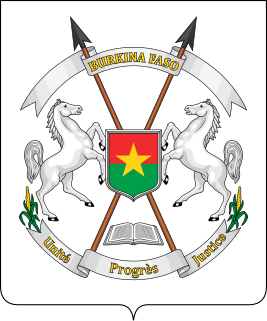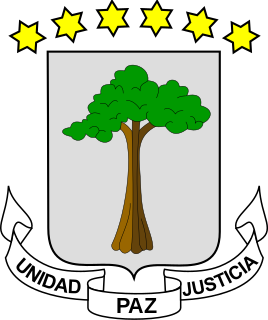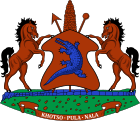
Human rights in Kenya internationally maintain a variety of mixed opinions; specifically, political freedoms are highlighted as being poor and homosexuality remains a crime. In the Freedom of the World index for 2017, Kenya held a rating of '4' for civil liberties and political freedoms, in which a scale of "1" to "7" is practised.

Human rights in Eritrea are viewed, as of the 2010s, by non-governmental organisations (NGOs) such as Human Rights Watch as among the worst in the world, particularly with regards to freedom of the press. Eritrea is a one-party state in which national legislative elections have been repeatedly postponed, the judiciary is weak, and constitutional provisions protecting individual freedom have yet to be fully implemented. Some Western countries, particularly the United States, accuse the Government of Eritrea of arbitrary arrest and detentions and of detaining an unknown number of people without charge for their political activism. The Eritrean government has continuously dismissed the accusations as politically motivated. As an attempt at reform, Eritrean government officials and NGO representatives have participated in numerous public meetings and dialogues. A new movement called Citizens for Democratic Rights in Eritrea, which aimed at bringing about dialogue between the government and opposition, was formed in early 2009.
Morocco has made considerable improvements since the repressive Years of Lead under King Hassan II's reign (1961–99). Nevertheless, there are still complaints about abuses of power under his relatively modernizing son, Mohammed VI. There has been a greater degree of modernisation, and more rights have been granted to the population in general, and particularly women and children. Under the reign of Hassan II, Morocco had one of the worst human rights records in Africa and the world, especially during the time period of the Years Of Lead, which lasted from the early 1960s until the late 1980s, which was a time period in the country's history that was known for the repression of political dissent and opposition, that involved the arrests, detention, imprisonment, and even killings of political opponents. Currently, Morocco continues to face at least some human rights problems, such as poor prison conditions, the mistreatment of women and the LGBT community, and the use of torture by police. Despite the considerable improvements made under the leadership of King Mohamed VI, repression of political dissidence is still commonplace in Morocco today.

The U.S. Department of State's Country Report on Human Rights Practices for São Tomé and Príncipe states that the government generally respects the human rights of its citizens, despite problems in a few areas.

Human rights in Chad have been described as "poor"; for example, Freedom House has designated the country as "Not Free." Chad received a score of 7 for political rights and 6 for civil liberties.

Historically, Comoros has had a relatively poor human rights record. In early 1979, Comorian authorities arrested some 300 supporters of the Soilih's regime and imprisoned them without trial in Moroni. Four of Soilih's former ministers also disappeared. For the next two years, there were further arrests, shootings, and disappearances. Under pressure from France, some trials were held but many Comorians remained political prisoners, despite protests from Amnesty International and other humanitarian organizations. The Abdallah regime also restricted freedom of speech, press, association, citizens' rights to change their government, women's rights, and workers' rights. After Abdallah's death on November 27, 1989, the country's human rights record improved. The European mercenaries who ruled the island ordered only a few arrests and released nearly all political prisoners who had been detained after the 1985 and 1987 coup attempts.

Human rights in Rwanda have been violated on a grand scale. The greatest violation is the Rwandan genocide of Tutsi in 1994. The post-genocide government is also responsible for grave violations of human rights.

The Republic of Congo gained independence from French Equatorial Africa in 1960. It was a one-party Marxist-Leninist state from 1969 to 1991. Multi-party elections have been held since 1992, although a democratically elected government was ousted in the 1997 civil war and President Denis Sassou Nguesso has ruled for 26 of the past 36 years. The political stability and development of hydrocarbon production made the Republic of the Congo the fourth largest oil producer in the Gulf of Guinea region, providing the country with relative prosperity despite instability in some areas and unequal distribution of oil revenue nationwide.
The Congolese Human Right Observatory claims a number of unresolved and pending issues in the country.
Discrimination against Pygmies is widespread, the result of cultural biases, especially traditional relationships with the Bantu, as well as more contemporary forms of exploitation.

Human rights in Madagascar are protected under the country's constitution. However the extent to which such rights are reflected in practice, is subject to debate. The 2009 Human Rights Report by the United States Department of State noted concerns regarding the suspension of democratic electoral processes as the result of recent political unrest. Furthermore, reports of corruption, arbitrary arrest and child labor highlight the prevalence of human rights issues in the country.

Human rights in Botswana are protected under the constitution. The 2009 Human Rights Report by the United States Department of State noted that in general the government of Botswana has respected the rights of its citizens.

Human rights in Cameroon are addressed in the constitution. However, the 2009 Human Rights Report by the United States Department of State noted concerns in regard to election irregularities, security forces torture and arbitrary arrests.

Human rights in Cape Verde are addressed under the national constitution.

Human rights in Burkina Faso are addressed in the constitution. The 2009 Human Rights Report by the United States Department of State noted concerns regarding restrictions on the press and the operation of the judiciary system.

Burundi is governed as a presidential representative democratic republic, with an estimated population of 10,557,259. The country has experienced a long history of social unrest and ethnic tension between the Hutu majority and Tutsi minority, with successive civil wars jeopardizing national development since Burundi's decolonization as a Belgian territory in 1962. The most recent conflict broke out in 1993 with the assassination of Burundi's first democratically elected president, Melchior Ndadaye, and led to large-scale violations of human rights and general impunity. In line with the Arusha Agreement of August 2000, peace was brokered between rebel groups the National Council for the Defense of Democracy–Forces for the Defense of Democracy (CNDD-FDD) and the National Forces of Liberation (FNL), and a new Constitution was adopted by national referendum in 2005. The Constitution established cognitive institutions of State, including the Executive, Judiciary, and Legislature, with a view to promoting the rule of law and a more cogent human rights framework.

Eswatini, Africa's last remaining absolute monarchy, was rated by Freedom House from 1972 to 1992 as "Partly Free"; since 1993, it has been considered "Not Free". During these years the country's Freedom House rating for "Political Rights" has slipped from 4 to 7, and "Civil Liberties" from 2 to 5. Political parties have been banned in Eswatini since 1973. A 2011 Human Rights Watch report described the country as being "in the midst of a serious crisis of governance", noting that "[y]ears of extravagant expenditure by the royal family, fiscal indiscipline, and government corruption have left the country on the brink of economic disaster". In 2012, the African Commission on Human and Peoples' Rights (ACHPR) issued a sharp criticism of Eswatini's human-rights record, calling on the Swazi government to honor its commitments under international law in regards to freedom of expression, association, and assembly. HRW notes that owing to a 40% unemployment rate and low wages that oblige 80% of Swazis to live on less than US$2 a day, the government has been under "increasing pressure from civil society activists and trade unionists to implement economic reforms and open up the space for civil and political activism" and that dozens of arrests have taken place "during protests against the government's poor governance and human rights record".

Human rights in Liberia became a focus of international attention when the country's president, Ellen Johnson Sirleaf, was named one of the three female co-winners of the 2011 Nobel Peace Prize, all of whom were cited "for their non-violent struggle for the safety of women and for women's rights to full participation in peace-building work".

Human rights are "rights and freedoms to which all humans are entitled". Proponents of the concept usually assert that everyone is endowed with certain entitlements merely by reason of being human.

The issue of human rights in Djibouti, a small country situated within the Horn of Africa, is a matter of concern for several human rights organizations.

Equatorial Guinea is known for human rights abuses. Under the current government it has "limited ability of citizens to change their government; increased reports of unlawful killings by security forces; government-sanctioned kidnappings; systematic torture of prisoners and detainees by security forces; life threatening conditions in prisons and detention facilities; impunity; arbitrary arrest and detention and incommunicado detention; harassment and deportation of foreign residents with limited due process; judicial corruption and lack of due process; restrictions on the right to privacy; restrictions on freedom of speech and of the press; restrictions on the rights of assembly, association, and movement; government corruption; violence and discrimination against women; suspected trafficking in persons; discrimination against ethnic minorities; and restrictions on labor rights."

Human rights in Guinea, a nation of approximately 10,069,000 people in West Africa, are a contentious issue. In its 2012 Freedom in the World report, Freedom House named Guinea "partly free" for the second year in a row, an improvement over its former status as one of the least free countries in Africa.





















